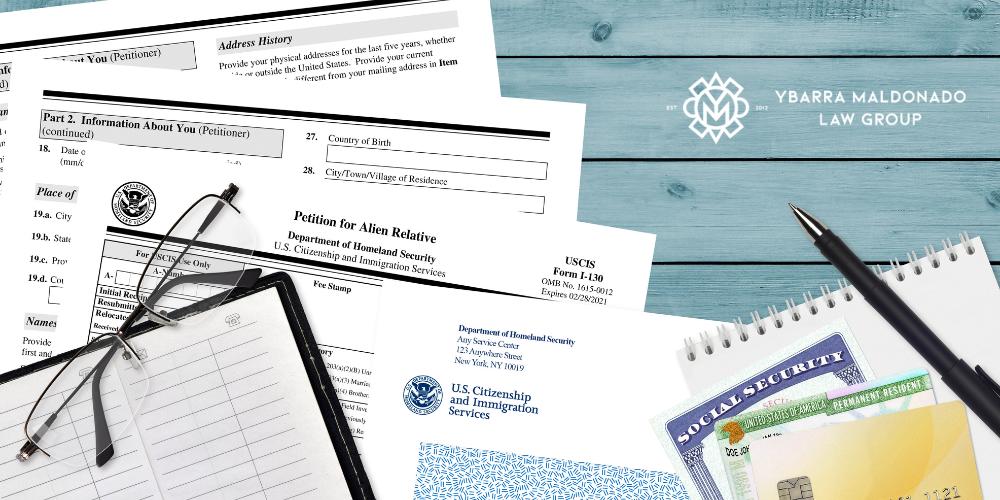Form I-130 Petition for Alien Relative
DON’T HESITATE TO REACH OUT TO US!
Our Law Firm is committed to becoming the best Law Firm for Latino, migrant, and Spanish speaking communities in Arizona.

Form I-130 Explained

Seemingly countless immigration forms exist, and they all serve a unique purpose. While these forms can be very helpful, they are often confusing or difficult to fill out. One example of an important USCIS form is the Form I-130 Petition for Alien Relative. This crucial form is the first step in helping eligible relatives immigrate to the United States and obtain a green card, according to the United States Citizenship and Immigration Services website.
At Ybarra Maldonado Law Group, our Phoenix immigration lawyers help immigrants and their families with many important forms and processes. If you need help filling out and submitting certain immigration forms, we are here for you. To schedule an appointment with us, please call 602-910-4040 today.
What Is a Form I-130, Petition for Alien Relative?
As a lawful permanent resident (LPR) or a United States Citizen (USC), you can file an I-130 form to start the process of bringing eligible relatives to the United States. Form I-130 is formally called the “Petition for Alien Relative.” This form is important because it establishes a valid family relationship between you (the LPR or USC) and the person seeking a green card.
In other words, this form is the first step in the family-based green card process. If you apply for a marriage visa, you must file Form I-130 to establish a legally valid marriage. Basically, this form helps you prove that your marriage is not based on fraud.
Lastly, this immigration paperwork gives you a spot in line for a green card. Once you file the form, your waiting period is determined by your priority date. A priority date is the date on which immigration services receive your form. Unless you sponsor an immediate relative, there’s no waiting period.
Is Form I-130 the Same as a Green Card?
No. However, Form I-130 is an important step in the process of immigrant visa petitions. Specifically, one would submit an I-130 Form as the first step in helping an eligible family member immigrate to the United States and obtain a green card. After one’s Form I-130 is approved, their family members can submit their immigrant visa petition to USCIS. After approval, USCIS forwards the petition to the National Visa Center for processing.
What Is Form I-130 Used For?
As we stated before, a lawful permanent resident or United States Citizen can submit this form to prove that a valid family relationship exists between the petitioner and certain alien relatives. In other words, it is an important document for anyone who wants to help a family member immigrate to the United States and obtain a green card.
Who Can File Form I-130?
Current United States citizens may file this form on behalf of an immediate relative. Examples of immediate family members include spouses, children, parents, and siblings. The person filing the petition is known as the “petitioner” or the “sponsor.” The person seeking lawful permanent residence, or a green card, is known as the “beneficiary.”
Who Can’t File Form I-130?
Importantly, there are a few exceptions regarding who may file Form I-130. Even if you can show a legally valid relationship, you cannot sponsor the following individuals with an I-130.
- Grandparents
- Adoptive parent or adopted child
- Your biological parent if you gained a green card through adoption
- Aunts, uncles, and cousins
- Nieces and nephews
- Parents-in-law
- Stepparents (unless marriage entered before age 18)
If you are unsure whether certain relatives and family members qualify under this petition, we recommend speaking with an experienced immigration attorney.
Can I Submit a Form I-130 Online?
Yes. You can do this even if your relative is already within the United States while filing this petition. To file online, you must first create an account with USCIS. Once you file the form, USCIS will send you a confirmation message as soon as they receive it. However, you cannot file a Form I-130 online if you also apply for a fee waiver.
Another important thing to remember is that, if your qualifying relative is also filing a Form I-485, this may affect your filing location. When people file multiple forms simultaneously, this is known as concurrent filing.
If you need help filing your petition online, you can always read the written instructions from USCIS or speak with a qualified immigration lawyer.
How to Submit I-130 By Mail
Filing locations for each person vary depending on where they live in the United States. Depending on which location is closest to you, you can mail the petition to the Dallas, Chicago, or Phoenix Lockbox locations. For a full list of direct filing addresses, visit the USCIS website.
What Documents Should I Include in My Form I-130 Petition?
Certain documents are required to submit your I-130. These required supporting documents help to show valid family relationships between green card holders and eligible family members. Below, we list the required documents for an I-130.
Required Documents
- Proof of your citizenship or green card holder status (such as the green card itself or a naturalization certificate)
- Proof of a legally valid relationship (such as a marriage certificate)
- Birth certificate of the sponsor
- Birth certificates of the green card applicant to prove nationality
Alternative Documents
If you cannot acquire certain required documents, you can always supply alternative documents to the USCIS. Alternative support documents are called “secondary evidence.” They help USCIS decide if the original documents are not available to you.
For example, maybe you cannot get a copy of your birth certificate. In this case, you must acquire other supporting documents or records to prove the facts of your birth. Examples of supporting documents include baptism certificates, school records, and more. Remember that USCIS can still issue a request for evidence (RFE) if they are not satisfied with your supporting documents.
What Happens If I Don’t Have the Required Supporting Documents for Form I-130?
If you are missing certain required documents, you may still have options. Following the birth certificate example, suppose the family member you are petitioning for does not have a birth certificate. In this case, you could either submit a letter to the appropriate authorities to confirm the certificate does not exist or submit alternative documents.
If USCIS receives your petition and discovers that you lack certain documents, they will likely send you an RFE (request for evidence). As it sounds, a request for evidence is a USCIS request for more information or evidence regarding your case.
While an RFE gives you another chance to submit supporting evidence, it can also drastically lengthen the process. To avoid these types of delays, we strongly recommend speaking with a qualified Phoenix immigration lawyer. They will help you gather all the necessary documentation and evidence for your case, decreasing the chances of receiving an RFE.
How to Fill Out Form I-130 Petition for Alien Relative
It is incredibly important that you fill out this form completely and correctly. If you fail to do so, USCIS may reject your petition. This is a long document with multiple sections you must fill out as fully and accurately as possible.
Below, we will provide a brief overview of the sections. We recommend working with an immigration law firm to have the best chance of success with your petition. When you work with a qualified immigration attorney, you will have knowledgeable, compassionate assistance throughout every step of the process.
- Part 1: Relationship – In this section, you are the Petitioner. Your qualifying relative is the Beneficiary.
- Part 2: Petitioner Information – You must include the following information about yourself.
- Alien registration number
- USCIS online account number
- Your legal last name
- Your legal first name
- Middle name, if applicable to you
- Other names, such as maiden names, aliases, etc.
- Your mailing address
- Any prior marriage, if applicable to you
- Naturalization certificate number
- Class of Admission
- Part 3: Petitioner Biographical Information – This includes your race and ethnicity.
- Part 4: Beneficiary Information – This includes relevant A-numbers, social security numbers, and USCIS account numbers. It also includes previously filed I-130 forms, relevant family details, Class of Admission, form I-94, passports and travel documents, records of removal proceedings, and immigrant visas.
- Part 5: Other Relevant Information – This section mostly covers Form I-130 information and asks whether or not you have filed this form in the past.
- Part 6: Petitioner Statement – You will provide a statement as the petitioner, sign and affirm the information in the form, provide a signature, provide the date, and provide your contact information. You will also provide your email address. If you do not sign and date this form, USCIS will reject it.
- Part 7: Interpreter Information – You must only fill out this section if you used an interpreter. The interpreter must provide their contact information and sign and date the form.
- Part 8: Information of Persons Other Than Petitioner – This section is only necessary if someone helps you fill out your form. If the person helping you is an attorney, they must fill out a form G-28 to submit along with the petition.
- Part 9: Extra Information – If you have any supporting documents or extra information to provide, this is where you will attach that information.
Form I-130 Instructions
USCIS provides a helpful, 12-page document, including instructions for filing Form I-130. It begins by outlining the purpose of Form I-130 and who is eligible to file the form. It also covers information such as the following.
- General instructions: signatures, filing fees, biometrics fees, evidence requirements, biometrics appointments, copies, translations, and filling out the form.
- General requirements: visa availability, documents to show citizenship, documents to show LPR status, and documents to prove family relationships.
- Filing fees: Form I-139 filing fee, how to check if the fees are correct.
- Where to file
- Address changes
- Processing information: initial processing, RFEs, interview requests, and eligibility determinations.
Form I-130 Filing Fees
Costs for sponsoring an immediate relative depend on how many relatives you intend to sponsor. The base filing fee for I-130 is $535. It is not possible to petition to waive this fee. Additionally, it is non-refundable.
You can pay this amount to USCIS through money orders, cashier’s checks, personal checks, and credit cards. If using a credit card, you must also file a Form G-1450, which authorizes credit card payments.
How to Write a Check for Form I-130
If you are paying with a personal check, you must write your check a certain way. Checks must include the following information.
- Date on which you are writing the check
- Paid to the order of “U.S. Department of Homeland Security”
- Exact dollar amount for the petition filing fee
- Spell out the exact dollar amount in words
- Write a brief description of the check’s purpose. For example, you could write “I-130 filing fee for (Beneficiary’s Name)”
- Sign the check
Form I-130 Processing Time 2023
Unfortunately, USCIS office processing times for I-130 petitions range from five months to thirty months. Processing times generally vary depending on the USCIS field office that receives your petition, as well as your family relationship with the beneficiary.
Immediate relatives, such as a spouse or unmarried children, currently have shorter wait times than other beneficiaries. Rather than waiting as long as 30 months, they may only wait as long as 14.5 months for their processing time.
What Happens After Your I-130 Is Approved?
Once your petition has been approved, it will move on to the next phase, which is the processing time. You will get a receipt notice once your application begins processing, and you can check the status of your application. As we stated above, the processing time varies depending on the relationship between the sponsor and the beneficiary, as well as on whether or not you are both in the United States.
How Many I-130s Are Approved Every Year?
Many visa categories, including family preference, have numerical limits on the number of approvals available each year. In recent years, the approval rate for Form I-130 petitions has been as high as 99%. Luckily, immediate relatives are not subject to those numerical limits, and will most likely be approved by USCIS.
What Happens if My I-130 Form Is Denied?
It’s important to note that, if the United States government intends to deny your application, it will not happen instantaneously. Rather, they will issue a Notice of Intent to Deny, or NOID. This notice gives you and your beneficiary the opportunity to respond and give more evidence to support your case.
The NOID will explain why your case currently cannot be approved. This is helpful, as it allows you to know exactly what to supply to have a better chance at success. If you are still denied after you respond to USCIS, you may need to resubmit a new petition.
Contact a Phoenix Immigration Attorney Today
At Ybarra Maldonado Law Group, we can provide you with step-by-step instructions on how to apply for immigrant visas, register permanent residence, adjust status, and advise you on all immigration court proceedings. In other words, we are well-equipped with years of experience handling Phoenix immigration cases. If you are having trouble with one of many commonly encountered immigration matters, we’re here to help. Please contact a Phoenix immigration lawyer with our law firm at 602-910-4040 today.
TELL US YOUR STORY.
DONT WAIT. LET OUR LAW FIRM HELP YOU.





